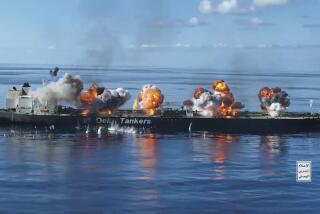Iran Intercepts Soviet Freighter in Persian Gulf
- Share via
MOSCOW — The Soviet Union said Wednesday that an Iranian warship has intercepted a Soviet freighter in the Persian Gulf and that Iranian forces have boarded the ship to determine whether it was carrying arms to Iraq.
A Foreign Ministry spokesman, Gennady I. Gerasimov, said the Soviet vessel, the 11,750-ton Pyotr Yemtsov, was in international waters at the time.
Iran’s official Islamic Republic News Agency confirmed, in a dispatch broadcast by Tehran radio, that a Soviet freighter “suspected of carrying goods for Iraq” has been intercepted and that it is being inspected.
No Moscow Protest
The Soviet government made no immediate protest. Western diplomats said Moscow might minimize the incident if the ship and its crew are allowed to proceed without harm.
Shipping sources at Manama, Bahrain, not far from where the Pyotr Yemtsov was halted Tuesday afternoon, told the Associated Press that the Soviet ship broadcast a distress signal and that it halted only after the Iranians threatened to open fire. They said the ship was escorted to Bandar Abbas, in Iran, and was being unloaded there.
Japanese tankers in the area recorded the distress message as saying: “Pyotr Yemtsov . . . is seized by Iranian navy vessel in open sea at second September 1400GMT (Greenwich mean time) in position of 25.39 north and 54.29 east.”
The coordinates mentioned in the distress signal are about 45 miles northwest of Dubai in the United Arab Emirates.
These shipping sources, who asked not to be quoted by name, said that a second Soviet freighter, identified only as the Tutov, was stopped by the Iranians early Wednesday but was allowed to proceed.
On Way to Kuwait
Gerasimov did not mention the Tutov. He said the Pyotr Yemtsov carried a cargo of cement and offered no details on the crew, either their number or whether any had been injured in the incident. The shipping sources said that the Pyotr Yemtsov had been en route to Kuwait.
Lloyd’s Register of Ships lists the Pyotr Yemtsov as a general cargo vessel built in 1975, about 475 feet in length and registered to the USSR-Black Sea Shipping Co. of Odessa. It does not list a ship called the Tutov.
Earlier this week, the commander of Iran’s navy, Capt. Mohammed Hussein Malekzadegan, was quoted as saying that his warships intercept as many as 20 ships a day to ensure that they are not delivering supplies to Iraq that will be of use in its war effort against Iran.
An American freighter, the President Taylor, was boarded and searched in the same area in January but was detained for only a few hours.
U.S. Vessel Was Stopped
American reaction to the January incident was generally mild. A U.S. spokesman said the boarding might have been not only appropriate but legal. “The rules of naval warfare,” he said, “have traditionally accorded the belligerent certain rights to ascertain whether neutral shipping is being used to provide contraband to an opposing belligerent.”
The latest incident in the gulf involving a superpower came as ground fighting intensified in the six-year-old war between Iran and Iraq. The Soviet Union has appealed for a swift settlement of the conflict and publicly maintained a policy of neutrality, but it has been Iraq’s major arms supplier.
The Pyotr Yemtsov and the Tutov are the first Soviet ships known to have been involved in such vessel stopping incidents. Diplomats, shipping executives and Soviet experts here, in Manama and in Washington said they had not expected any such action because the Soviet Union and Iran recently have been trying to improve their relations.
Soviets Reduce Exports
Top officials from Iran and the Soviet Union have exchanged visits in recent months. In an effort to narrow its political differences with Iran and increase its own influence in the strategic Persian Gulf, Moscow agreed to reduce its oil exports to Western Europe by 100,000 barrels a day. The move was intended to prop up declining prices, which have hit Iran hard.
During a visit last month to Moscow by Oil Minister Gholamreza Aghazadeh, Iran agreed to resume delivery of natural gas to the Caucasian republics of the Soviet Union in December, after a feasibility study on the state of a disused pipeline running from Iran to the southern Soviet republics. Iran’s gas sales to Moscow stopped in 1979 after the ouster of Shah Mohammed Reza Pahlavi, and the pipeline was closed.
At the time, it was thought that Iran had made such overtures to Moscow in an effort to persuade Iraq that even its supporters in the world community had begun to perceive that Iran had gained the upper hand in the war and wanted to come to terms with Iran.
Despite these recent moves, the political differences between the two countries remain sharp.
Criticism From Kremlin
The Kremlin has kept up steady criticism of Iran’s treatment of Iranian Communists--16 Soviets were expelled as spies in 1984--and of Tehran’s support for Muslim guerrillas fighting the Soviet-backed government of Afghanistan.
Iran, in turn, has depicted the Soviet Union as second only to the United States as an evil power opposed to the fundamentalist government of the Ayatollah Ruhollah Khomeini.
Iran also has been increasingly intent on putting military pressure on Iraq by challenging ships that might be carrying military cargoes to the Baghdad government. Its decision to halt Soviet ships, diplomatic analysts said, is the latest sign of the stepped-up campaign to shut off arms supplies.
A spokesman for the State Department, Charles Redman, said in Washington that he has no detailed information on the incident.
“While there is a basis in international law for searches for contraband by parties to an armed conflict in certain circumstances, we have observed on numerous occasions that the Iranian practice of stopping and searching neutral shipping in the gulf area is inherently dangerous and carries a risk of misunderstanding and violence,” Redman said.
Analyst Thomas L. McNaugher of the Brookings Institution, a Washington think tank, said the seizure of the Soviet vessel was a surprise because, until now, Iran had been treating Soviet ships “with kid gloves.”
More to Read
Sign up for Essential California
The most important California stories and recommendations in your inbox every morning.
You may occasionally receive promotional content from the Los Angeles Times.









